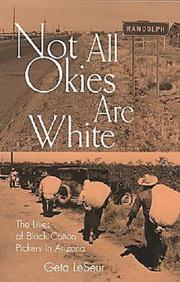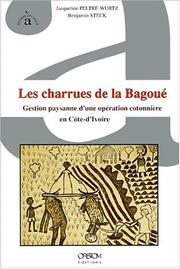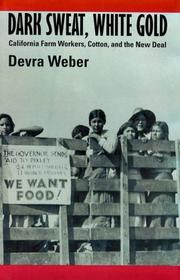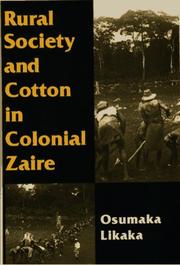| Listing 1 - 6 of 6 |
Sort by
|

ISBN: 0826212719 082626221X 9780826262219 9780826212719 Year: 2000 Publisher: Columbia, Mo. : University of Missouri Press,
Abstract | Keywords | Export | Availability | Bookmark
 Loading...
Loading...Choose an application
- Reference Manager
- EndNote
- RefWorks (Direct export to RefWorks)
"Vividly revealing the challenges faced by a group of migrant workers who eventually farmed the multiracial town of Randolph, Arizona, Not All Okies Are White is a celebration of the resilience and adaptability of people too often ignored by history texts." "Not All Okies Are White recaptures the ways of life for black migrant workers, as well as Hispanics and Native Americans, in the first half of the century through richly detailed interviews of the families of Randolph's founders. Through the words of each narrator, these personal stories recount work experiences and survival strategies offering new insights into the people's relationship to the land. The narratives reveal a creative tension between place and identity, movement and migration. LeSeur provides a historical, cultural, and literary context for the oral histories by incorporating news articles, information culled from historical society archives, analyses of films and novels, advertisements, and photographs." "Not All Okies Are White will appeal to scholars and general readers interested in oral history, African American history, multicultural studies, and women's studies."--Jacket.
Cotton farmers --- African American agricultural laborers --- Afro-American agricultural laborers --- Agricultural laborers, African American --- Negro agricultural laborers --- Cotton growers --- Farmers, Cotton --- Growers, Cotton --- Agricultural laborers --- Farmers --- E-books

ISBN: 2709924722 2709910268 Year: 2018 Publisher: Marseille : IRD Éditions,
Abstract | Keywords | Export | Availability | Bookmark
 Loading...
Loading...Choose an application
- Reference Manager
- EndNote
- RefWorks (Direct export to RefWorks)
Dans les années soixante-dix, les organismes internationaux prennent le relais des États du tiers monde pour soutenir et contrôler les politiques agricoles qui ont précédemment échoué. En Côte-d'Ivoire, la Banque mondiale finance un ambitieux projet de la Compagnie ivoirienne pour le Développement des Textiles (CIDT) : introduire la culture attelée, intensifier les cultures vivrières et rendre les champs permanents dans le Nord-Ouest ivoirien. Ce livre retrace les débuts (1974 à 1978) de la passionnante aventure de paysans qui, dans une région faiblement peuplée, ont élaboré des systèmes agraires en harmonie avec l'environnement. Opérant un tri dans la panoplie technologique proposée par la CIDT, ils restent à l'affût de ce qui améliorera leur niveau de vie ou l'organisation de leur travail. Mais les nouvelles techniques contribuent à accentuer les différenciations socio-économiques ; la stabilisation des cultures demeure encore une chimère, pour la CIDT comme pour les paysans, et, dans ces conditions, le bulldozer ravage les sols ; la concurrence vivriers-coton n'est pas un vain mot quand c'est une société cotonnière qui se charge de promouvoir le riz et le maïs ; l'installation récente des Peul et de leurs zébus chassés du Sahel par la sécheresse suscite des projets de développement contraignants, pour les éleveurs comme pour les paysans ; les villes attirent les jeunes aussi... Tout bouge, la voie du développement n'est décidément pas aussi clairement tracée que le croyait la CIDT, mais la culture attelée est adoptée et la puissante volonté de progrès des paysans ne laisse pas indifférent. Quinze ans ont passé. De nouvelles études de l'ORSTOM cherchent à saisir l'évolution actuelle : l'ajustement structurel sévit ici comme ailleurs dans le tiers monde, les charrues sont toujours là, mais il n'y a plus l'aide de l'État comme dans les années soixante, plus d'aide internationale comme dans les années soixante-dix, les paysans se trouvent seuls à inventer leur…
Cotton farmers --- Farm management --- Agricultural development projects --- Social aspects --- Bagoué Region (Cote d'Ivoire) --- Rural conditions. --- Development projects, Agricultural --- Projects, Agricultural development --- Agricultural assistance --- Agriculture --- Economic development projects --- Rural development projects --- Farm organization --- Farms --- Land tenure --- Management --- Agricultural landscape management --- Agricultural systems --- Cotton growers --- Farmers, Cotton --- Growers, Cotton --- Farmers --- Economic aspects --- agriculture --- système agraire --- coton --- économie rurale --- culture de rente --- changement social --- élevage --- développement rural --- population rurale --- utilisation du sol --- culture attelée

ISBN: 0520918479 058509859X 9780520918474 9780585098593 0520084896 0520207106 Year: 1994 Publisher: Berkeley, CA : University of California Press,
Abstract | Keywords | Export | Availability | Bookmark
 Loading...
Loading...Choose an application
- Reference Manager
- EndNote
- RefWorks (Direct export to RefWorks)
In her incisive analysis of the shaping of California's agricultural work force, Devra Weber shows how the cultural background of Mexican and, later, Anglo-American workers, combined with the structure of capitalist cotton production and New Deal politics, forging a new form of labor relations. She pays particular attention to Mexican field workers and their organized struggles, including the famous strikes of 1933.Weber's perceptive examination of the relationships between economic structure, human agency, and the state, as well as her discussions of the crucial role of women in both Mexican and Anglo working-class life, make her book a valuable contribution to labor, agriculture, Chicano, Mexican, and California history.
Cotton farmers --- Foreign workers, Mexican --- Migrant agricultural laborers --- NON-CLASSIFIABLE. --- Agricultural migrants --- Migrant agricultural workers --- Migrant farm workers --- Migrants --- Agricultural laborers --- Migrant labor --- Alien labor, Mexican --- Mexican foreign workers --- Cotton growers --- Farmers, Cotton --- Growers, Cotton --- Farmers --- History --- California. --- History. --- California --- E-books --- 20th century american labor politics. --- 20th century american politics. --- agriculture. --- california. --- californian history. --- capitalism. --- chicano history. --- cotton production. --- cotton. --- cultural studies. --- economic structure. --- hispanic american demographic studies. --- human agency. --- labor force. --- labor relations. --- labor. --- latin american history. --- mexican field workers. --- mexican workers. --- migrant workers. --- migration. --- new deal politics. --- new deal relief policies. --- strikes. --- the strike of 1933. --- united states of america. --- worker strikes. --- working class.

ISBN: 0299153347 0299153304 9786612424076 0585081093 0299153339 1282424076 9780585081090 9780299153335 9780299153342 9780299153304 9781282424074 6612424079 Year: 1997 Publisher: Madison, WI : University of Wisconsin Press,
Abstract | Keywords | Export | Availability | Bookmark
 Loading...
Loading...Choose an application
- Reference Manager
- EndNote
- RefWorks (Direct export to RefWorks)
Cotton farmers --- Cotton trade --- Peasants --- Producteurs de coton --- Coton --- Paysannerie --- History. --- History --- Histoire --- Commerce --- Congo (Democratic Republic) --- Congo (République démocratique) --- Rural conditions. --- Conditions rurales --- ZR / Congo - Kongo (Zaire) --- 92 --- 325 --- 338.722.0 --- 338.724 --- Geschiedenis. --- Koloniale politiek. --- Landbouweconomie: algemeenheden. --- Teelten. --- Labor & Workers' Economics --- Business & Economics --- Histoire. --- 92 Geschiedenis. --- 92 Histoire. --- 92 History. --- Congo (République démocratique) --- Peasantry --- Cotton growers --- Farmers, Cotton --- Growers, Cotton --- Congo (Leopoldville) --- République du Congo (Leopoldville) --- Republic of the Congo (Leopoldville) --- Republic of Congo (Leopoldville) --- République démocratique du Congo --- Democratic Republic of the Congo --- Demokraticheskai︠a︡ Respublika Kongo --- Kongo --- Congo (Kinshasa) --- RDC (République démocratique du Congo) --- DRC (Democratic Republic of the Congo) --- DRK (Demokraticheskai︠a︡ Respublika Kongo) --- Democratic Republic of Congo --- DR Congo --- RD Congo --- Agricultural laborers --- Rural population --- Marks (Medieval land tenure) --- Villeinage --- Textile industry --- Farmers --- Belgian Congo --- Zaire --- Koloniale politiek --- Landbouweconomie: algemeenheden --- Teelten --- Geschiedenis --- E-books --- Rural conditions --- Congo DR --- R.D. Congo

ISBN: 0807876135 9780807876138 0807824569 9780807824566 0807847607 9780807847602 9798890870612 Year: 1999 Publisher: Chapel Hill : University of North Carolina Press,
Abstract | Keywords | Export | Availability | Bookmark
 Loading...
Loading...Choose an application
- Reference Manager
- EndNote
- RefWorks (Direct export to RefWorks)
Rural women comprised the largest part of the adult population of Texas until 1940 and in the American South until 1960. On the cotton farms of Central Texas, women's labor was essential. In addition to working untold hours in the fields, women shouldered most family responsibilities: keeping house, sewing clothing, cultivating and cooking food, and bearing and raising children. But despite their contributions to the southern agricultural economy, rural women's stories have remained largely untold. Using oral history interviews and written memoirs, Rebecca Sharpless weaves a moving account of women's lives on Texas cotton farms. She examines how women from varying ethnic backgrounds--German, Czech, African American, Mexican, and Anglo-American--coped with difficult circumstances. The food they cooked, the houses they kept, the ways in which they balanced field work with housework, all yield insights into the twentieth-century South. And though rural women's lives were filled with routines, many of which were undone almost as soon as they were done, each of their actions was laden with importance, says Sharpless, for the welfare of a woman's entire family depended heavily upon her efforts.
Rural women --- Cotton farmers --- Cotton growers --- Farmers, Cotton --- Growers, Cotton --- Farmers --- Women --- History --- Texas --- Teksas --- Tekhas --- Tejas --- Texas (Republic) --- Texas (Province) --- Republic of Texas --- State of Texas --- تكساس --- Tiksās --- ولاية تكساس --- Wilāyat Tiksās --- Штат Тэхас --- Shtat Tėkhas --- Тэхас --- Тексас --- Техас --- Akałii Bikéyah --- Téʼsiz Hahoodzo --- Τέξας --- Πολιτεία του Τέξας --- Politeia tou Texas --- Estado de Texas --- Teksaso --- Tet-khiet-sat-sṳ̂ --- Teeksăs --- 텍사스 주 --- T'eksasŭ-ju --- 텍사스주 --- T'eksasŭju --- 텍사스 --- T'eksasŭ --- Kekeka --- Taaksaas --- טקסס --- מדינת טקסס --- Medinat Ṭeḳsas --- Texia --- Civitas Texiae --- Teksasa --- Teksasas --- テキサス州 --- Tekisasu-shū --- Tekisasushū --- テキサス --- Tekisasu --- Texas suyu --- Teksas Eyaleti --- טעקסעס --- Ṭeḳses --- Teksasos --- 得克萨斯州 --- Dekesasi zhou --- 得克萨斯 --- Dekesasi --- TX --- Tex. --- Coahuila and Texas (Mexico) --- Texas (Provisional government, 1835) --- Rural conditions.
Book
ISBN: 1283519348 9786613831798 1400842816 9781400842810 9780691139500 0691139504 9781283519342 Year: 2012 Publisher: Princeton, N.J. : Princeton University Press,
Abstract | Keywords | Export | Availability | Bookmark
 Loading...
Loading...Choose an application
- Reference Manager
- EndNote
- RefWorks (Direct export to RefWorks)
As human populations grow and resources are depleted, agriculture will need to use land, water, and other resources more efficiently and without sacrificing long-term sustainability. Darwinian Agriculture presents an entirely new approach to these challenges, one that draws on the principles of evolution and natural selection. R. Ford Denison shows how both biotechnology and traditional plant breeding can use Darwinian insights to identify promising routes for crop genetic improvement and avoid costly dead ends. Denison explains why plant traits that have been genetically optimized by individual selection--such as photosynthesis and drought tolerance--are bad candidates for genetic improvement. Traits like plant height and leaf angle, which determine the collective performance of plant communities, offer more room for improvement. Agriculturalists can also benefit from more sophisticated comparisons among natural communities and from the study of wild species in the landscapes where they evolved. Darwinian Agriculture reveals why it is sometimes better to slow or even reverse evolutionary trends when they are inconsistent with our present goals, and how we can glean new ideas from natural selection's marvelous innovations in wild species.
Sustainable agriculture. --- Agricultural biotechnology. --- Evolution (Biology) --- Crops --- Low-input agriculture --- Low-input sustainable agriculture --- Lower input agriculture --- Resource-efficient agriculture --- Sustainable farming --- Agriculture --- Alternative agriculture --- Crop evolution --- Agro-biotechnology --- Biotechnology --- Animal evolution --- Animals --- Biological evolution --- Darwinism --- Evolutionary biology --- Evolutionary science --- Origin of species --- Biology --- Evolution --- Biological fitness --- Homoplasy --- Natural selection --- Phylogeny --- Evolution. --- Crops - Evolution --- Agricultural biotechnology --- Sustainable agriculture --- Colin Donald. --- Green Revolution. --- adaptation. --- agricultural ecosystems. --- agricultural research. --- agriculture. --- agroecologists. --- agroecology. --- animals. --- bet-hedging. --- biodiversity. --- biotechnology. --- cheating. --- chemicals. --- competition. --- complementarity. --- conflict. --- cooperation. --- cotton farmers. --- crop diversity. --- crops. --- cultivation. --- drought tolerance. --- environmental impact. --- evolution. --- evolutionary arms races. --- evolutionary biology. --- farmers. --- food production. --- food security. --- food supply. --- fungus-growing ants. --- genes. --- genetic engineering. --- genetic improvement. --- group selection. --- intercropping. --- kin selection. --- leaf-cutter ants. --- multispecies interactions. --- mutualism. --- natural ecosystems. --- natural selection. --- nitrogen fixation. --- nutrient-use efficiency. --- nutrients. --- perennial grain crops. --- pest control. --- pesticide resistance. --- pests. --- phenotypic plasticity. --- photosynthesis. --- plant breeding. --- plants. --- population. --- refuge strategy. --- reindeer. --- reproductive success. --- resource-use efficiency. --- sanctions. --- sustainability. --- tradeoffs. --- transfer RNA. --- transportation. --- trees. --- water-use efficiency. --- watergrass. --- weeds. --- wild rice. --- wild species. --- yield.
| Listing 1 - 6 of 6 |
Sort by
|

 Search
Search Feedback
Feedback About UniCat
About UniCat  Help
Help News
News